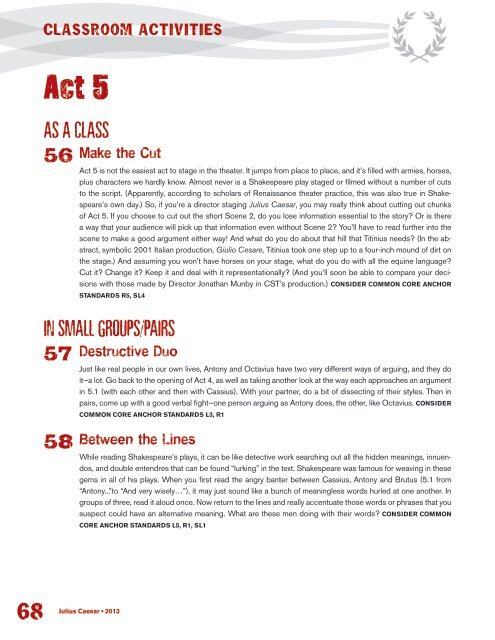Julius Caesar • 2013 - Chicago Shakespeare Theater
Julius Caesar • 2013 - Chicago Shakespeare Theater
Julius Caesar • 2013 - Chicago Shakespeare Theater
Create successful ePaper yourself
Turn your PDF publications into a flip-book with our unique Google optimized e-Paper software.
68<br />
CLASSROOM ACTIVITIES<br />
Act 5<br />
AS A CLASS<br />
56<br />
Make the Cut<br />
Act 5 is not the easiest act to stage in the theater. It jumps from place to place, and it’s filled with armies, horses,<br />
plus characters we hardly know. Almost never is a <strong>Shakespeare</strong> play staged or filmed without a number of cuts<br />
to the script. (Apparently, according to scholars of Renaissance theater practice, this was also true in <strong>Shakespeare</strong>’s<br />
own day.) So, if you’re a director staging <strong>Julius</strong> <strong>Caesar</strong>, you may really think about cutting out chunks<br />
of Act 5. If you choose to cut out the short Scene 2, do you lose information essential to the story? Or is there<br />
a way that your audience will pick up that information even without Scene 2? You’ll have to read further into the<br />
scene to make a good argument either way! And what do you do about that hill that Titinius needs? (In the abstract,<br />
symbolic 2001 Italian production, Giulio Cesare, Titinius took one step up to a four-inch mound of dirt on<br />
the stage.) And assuming you won’t have horses on your stage, what do you do with all the equine language?<br />
Cut it? Change it? Keep it and deal with it representationally? (And you’ll soon be able to compare your decisions<br />
with those made by Director Jonathan Munby in CST’s production.) CONSIDER COMMON CORE ANCHOR<br />
STANDARDS R5, SL4<br />
IN SMALL GROUPS/PAIRS<br />
57<br />
58<br />
Destructive Duo<br />
Just like real people in our own lives, Antony and Octavius have two very different ways of arguing, and they do<br />
it—a lot. Go back to the opening of Act 4, as well as taking another look at the way each approaches an argument<br />
in 5.1 (with each other and then with Cassius). With your partner, do a bit of dissecting of their styles. Then in<br />
pairs, come up with a good verbal fight—one person arguing as Antony does, the other, like Octavius. CONSIDER<br />
COMMON CORE ANCHOR STANDARDS L3, R1<br />
Between the Lines<br />
While reading <strong>Shakespeare</strong>’s plays, it can be like detective work searching out all the hidden meanings, innuendos,<br />
and double entendres that can be found “lurking” in the text. <strong>Shakespeare</strong> was famous for weaving in these<br />
gems in all of his plays. When you first read the angry banter between Cassius, Antony and Brutus (5.1 from<br />
“Antony...”to “And very wisely…”), it may just sound like a bunch of meaningless words hurled at one another. In<br />
groups of three, read it aloud once. Now return to the lines and really accentuate those words or phrases that you<br />
suspect could have an alternative meaning. What are these men doing with their words? CONSIDER COMMON<br />
CORE ANCHOR STANDARDS L5, R1, SL1<br />
<strong>Julius</strong> <strong>Caesar</strong> <strong>•</strong> <strong>2013</strong>




